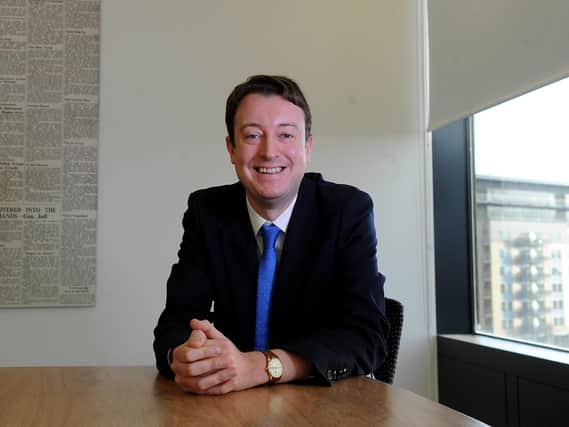Scrapping North Yorkshire's district councils 'integral' to region's devolution deal, leaders told


Local leaders in North Yorkshire have looked on in envy as devolution deals unlocking powers and billions of pounds in cash have been signed in West and South Yorkshire since the beginning of the year as Boris Johnson pushed ahead with his levelling up agenda.
But following a meeting with Local Government Minister Simon Clarke earlier this week, what has been described as a “bun fight” over the structure of local authorities in the region looks set to come to the fore before any deal can be agreed.
Advertisement
Hide AdAdvertisement
Hide AdCurrently North Yorkshire is made up of North Yorkshire County Council, which runs services such as social care, transport, and education, then seven district councils running planning, waste collection and other services. York Council stands alone running all those services as one overarching authority.
The current arrangement has been in place since local government reorganisation in 1974.
But The Yorkshire Post understands Ministers believe that if another tier of government in the form of a metro mayor is to be introduced, some of the current system will need to be slimmed down, which could involve scrapping district councils.
North Yorkshire previously pushed for a unitary arrangement in the region more than decade ago, but plans were vetoed.
Advertisement
Hide AdAdvertisement
Hide AdMr Clarke said today: “Establishing elected mayors and unitary councils, with the strong accountability they bring, is integral to ensuring that local institutions are fit for any major devolution of powers and budgets.”
But it is understood City of York is considered too small for a standalone authority, covering around 200,000 people, but North Yorkshire with around 600,000 would be too large. One supersize unitary authority would therefore be far too big with 800,000 residents.
Coun Carl Les, the leader of North Yorkshire County Council, said: “Linking strong devolution deals to unitary status is the challenge Government has issued.
“We are at a critical time for our county and region and can see the positive opportunities to simplify structures and access to high quality services, strengthen our economy and voice nationally to lobby for greater investment and save significant sums of money.”
Advertisement
Hide AdAdvertisement
Hide AdBut a move to a unitary system would threaten the existence of district councils in Craven, Selby, Ryedale, Richmondshire, Scarborough, Harrogate, and Hambleton which are likely to want to stave off job losses and keep control over their own services which some argue are better delivered on a more local basis.
It is understood the seven district councils are working on proposals to send to the Government.
Coun Keane Duncan, leader of Ryedale District Council, said: "It's a shock to be told, effectively, that your council could be gone within months. The message from Government is clear: they want devolution, they want reorganisation, and they want it fast.
"And while I feel Government is willing to work constructively with us, they are the ultimate decision maker in this situation and they do not need consent from us local authorities.
Advertisement
Hide AdAdvertisement
Hide Ad"So we can’t bury our heads in the sand. Every authority needs to be part of the discussions, every council leader needs to stand up for the best deal for their part of North Yorkshire."
Coun Duncan said he was "open minded" but added: "The one thing I stand in total and absolute opposition to is a super-council of 600,000 to 800,000 residents.
"An authority of this size, the second largest in the country, over the biggest geographical footprint, would no longer be ‘local’ government in any sense."
Coun Richard Foster, the leader of Craven District Council, said: “Change is most definitely coming. We don’t know where this goes.”
Advertisement
Hide AdAdvertisement
Hide AdHe said along with other authorities he would be putting forward the proposals he thought worked best by September, but he added: “We’re on the peripheries over in the west, Government is going to move away from Craven in the future.
“That’s why I think we have to work with the county to make sure Craven does still have a voice.”
He added: “We will have to make the best of it.”
Local leaders now have around two months to come up with proposals to be delivered to Mr Clarke.
Coun Les added: “I will work with anybody to work out some sort of consensus.”
Advertisement
Hide AdAdvertisement
Hide AdHe said Mr Clarke had urged local leaders to “get on with devolution” as it was central to the region’s recovery from coronavirus.
And he said it was clear that “if you don’t have a mayor you won’t get anywhere”.
Reorganisation of councils in North Yorkshire has been a topic of discussion for a number of years, but while before it had been a request, it is now a condition of unlocking the prize of devolution.
In York, the council launched a consultation to get the public’s views on devolution today (Friday).
Advertisement
Hide AdAdvertisement
Hide AdCouncil leader Keith Aspden said: “The possible scale of investment with devolution is significant, and therefore, it is incredibly important that local residents and organisations have the opportunity to have their say on this important first step, particularly on the outcomes we want to achieve.
“This feedback will help to guide our conversations on getting the right deal from the Government.”
Mr Clarke added: “I was delighted to meet with York and North Yorkshire leaders this week, and I am pleased with the progress we are making towards a great deal for the region.
“This Government is bringing forward the most ambitious devolution agenda in over 70 years to ensure towns, cities and communities of all sizes have the power and investment to drive growth and unleash their full potential.”
Comment Guidelines
National World encourages reader discussion on our stories. User feedback, insights and back-and-forth exchanges add a rich layer of context to reporting. Please review our Community Guidelines before commenting.